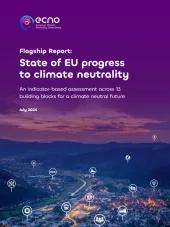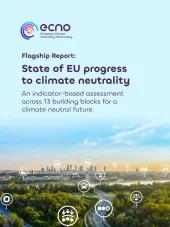Opportunities for a Competitive and Resilient Transition
In this briefing, published under the ECNO project, our authors analyse the EU agrifood sector’s current trajectory and policies, identifying key opportunities and roadblocks to enhance climate action, economic resilience, and global competitiveness.
Key enablers for the sector
The agriculture sector holds significant untapped potential to contribute to the EU’s climate neutrality goals. Yet, current and planned policies are expected to deliver only modest emissions reductions. Food waste reduction and an increase in plant-based foods are two key enablers that can drive deep emissions reductions while also advancing broader EU priorities. These shifts can improve public health, offer new income streams for farmers, and reduce reliance on imported feed and fertilisers. Innovation in food waste valorisation and plant-based proteins can position the EU agrifood sector as a global leader in sustainable production, enhancing its competitiveness and opening new market opportunities.
Policy levers to drive change
Progress is hindered by a lack of economic incentives and Common Agricultural Policy (CAP) subsidies favouring animal-based production, discouraging farmers from diversifying to more plant-based proteins. Limited affordability, a lack of market incentives and regulatory and structural hurdles slow dietary shifts and sustainable protein innovation.
Food waste reduction is constrained by data gaps, fragmented policies, and stalled regulatory reforms. With targeted policies and investments, the agrifood sector can become a strategic asset in Europe’s transition to a competitive and climate neutral economy.
Unlocking the potential of the EU agrifood sector
As the EU develops its post-2030 climate package, the agrifood sector can
become a lever for enhanced action. The EU’s long-term climate scenarios for agriculture largely rely on technological solutions and only envision moderate dietary shifts and reductions in food waste. However, the current declining trend in beef consumption, as analysed by ECNO to be on track to meet or exceed the benchmarks outlined in these scenarios, suggests that further progress is not only feasible but underway. This presents a timely opportunity for policy makers to reinforce and accelerate these trends.








